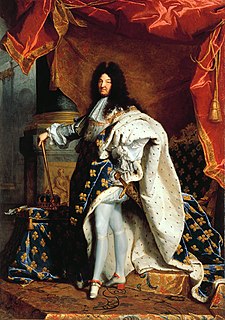A Quote by Niccolo Machiavelli
It may be observed, that provinces amid the vicissitudes to which they are subject, pass from order into confusion, and afterward recur to a state of order again; for the nature of mundane affairs not allowing them to continue in an even course, when they have arrived at their greatest perfection, they soon begin to decline.
Related Quotes
It is not knowledge, but the act of learning, not possession but the act of getting there, which grants the greatest enjoyment. When I have clarified and exhausted a subject, then I turn away from it, in order to go into darkness again; the never-satisfied man is so strange if he has completed a structure, then it is not in order to dwell in it peacefully,but in order to begin another. I imagine the world conqueror must feel thus, who, after one kingdom is scarcely conquered, stretches out his arms for others.
Up to this moment I have been pleased to entrust the government of my affairs to the late Cardinal. It is now time that I govern them myself. You [secretaries and ministers of state] will assist me with your counsels when I ask for them. I request and order you to seal no orders except by my command, . . . I order you not to sign anything, not even a passport . . . without my command; to render account to me personally each day and to favor no one.
As soon as I arrived in the Indies, in the first island which I found, I took some of the natives by force, in order that they might learn and might give me information of whatever there is in these parts. And so it was that they soon understood us, and we them, either by speech or by signs, and they have been very serviceable.
If getting our kids out into nature is a search for perfection, or is one more chore, then the belief in perfection and the chore defeats the joy. It's a good thing to learn more about nature in order to share this knowledge with children; it's even better if the adult and child learn about nature together. And it's a lot more fun.
To me, it appears no unjust simile to compare the affairs of this great Continent to the mechanism of a clock, each state representing some one or other of the smaller parts of it which they are endeavoring to put in fine order without considering how useless & unavailing their labor is unless the great Wheel or Spring which is to set the whole in motion is also well attended to & kept in good order.
To refuse any bond of union between man and civil society, on the one hand, and God the Creator and consequently the supreme Law-giver, on the other, is plainly repugnant to the nature, not only of man, but of all created things; for, of necessity, all effects must in some proper way be connected with their cause; and it belongs to the perfection of every nature to contain itself within that sphere and grade which the order of nature has assigned to it, namely, that the lower should be subject and obedient to the higher.
The powers delegated by the proposed Constitution to the federal government are few and defined. Those which are to remain in the State governments are numerous and indefinite. The former will be exercised principally on external objects, as war, peace, negotiation and foreign commerce. ... The powers reserved to the several States will extend to all the objects which in the ordinary course of affairs, concern the lives and liberties, and properties of the people, and the internal order, improvement and prosperity of the State.






































